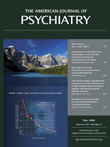The revision of DSM–III was the result of a great deal of work by a committee set up by APA in the 1980s. This committee worked over several years and coordinated its efforts with the World Health Organization. The result was the completely revised diagnostic classification published in 1987 known as DSM-III-R. This was an important contribution to the mental health field because it provided a clear way of defining addiction as compulsive drug-seeking behavior using criteria that turned out to have excellent interrater reliability and applicability to all forms of drug addiction. The classification was adopted with only minor changes in DSM-IV.
One of us (C.O.) was a member of the committee who attended every one of the committee meetings throughout the 1980s. There was good agreement among committee members as to the definition of addiction, but there was disagreement as to the label that should be used. The proponents of the term “addiction” believed that this word would convey the appropriate meaning of the compulsive drug-taking condition and would distinguish it from “physical” dependence, which is normal and can occur in anyone who takes medications that affect the CNS. Those who favored the term “dependence” felt that this was a more neutral term that could easily apply to all drugs, including alcohol and nicotine. The committee members argued that the word “addiction” was a pejorative term that would add to the stigmatization of people with substance use disorders. A vote was taken at one of the last meetings of the committee, and the word “dependence” won over “addiction” by a single vote.
Experience over the past two decades has demonstrated that this decision was a serious mistake. The term “dependence” has traditionally been used to describe “physical dependence,” which refers to the adaptations that result in withdrawal symptoms when drugs, such as alcohol and heroin, are discontinued. Physical dependence is also observed with certain psychoactive medications, such as antidepressants and beta-blockers. However, the adaptations associated with drug withdrawal are distinct from the adaptations that result in addiction, which refers to the loss of control over the intense urges to take the drug even at the expense of adverse consequences. For example, research has shown that when opiates are administered to a naive animal, adaptation begins to occur after the first dose so that the second dose has a discernibly decreased effect from the first. After several days of taking the medication, abrupt cessation produces a withdrawal syndrome varying with the duration of treatment and the dose level. This is an expected pharmacological response, and although it may occur among addicts, it is quite distinct from compulsive drug-seeking behavior. This has resulted in confusion among clinicians regarding the difference between “dependence” in a DSM sense, which is really “addiction,” and “dependence” as a normal physiological adaptation to repeated dosing of a medication. The result is that clinicians who see evidence of tolerance and withdrawal symptoms assume that this means addiction, and patients requiring additional pain medication are made to suffer. Similarly, pain patients in need of opiate medications may forgo proper treatment because of the fear of dependence, which is self-limiting by equating it with addiction.
The authors are now in the planning stages for DSM-V. There will be careful reviews of the criteria, but in the case of substance use disorders, the medical world drastically needs a change in labeling. Addiction is a perfectly acceptable word. It is used by the American Society of Addiction Medicine, the American Association of Addiction Psychiatrists, the American Journal on Addictions, and the oldest journal in the field, simply known as Addiction . It is clear that any harm that might occur because of the pejorative connotation of the word “addiction” would be completely outweighed by the tremendous harm that is now being done to the patients who have had needed medication withheld because their doctors believe that they are addicted simply because they are dependent.
We urge APA to consider these patients as well as the numerous clinicians in other fields who look to DSM for the classification of mental disorders. The current labeling is not only confusing and misleading, but it contributes to suffering.

